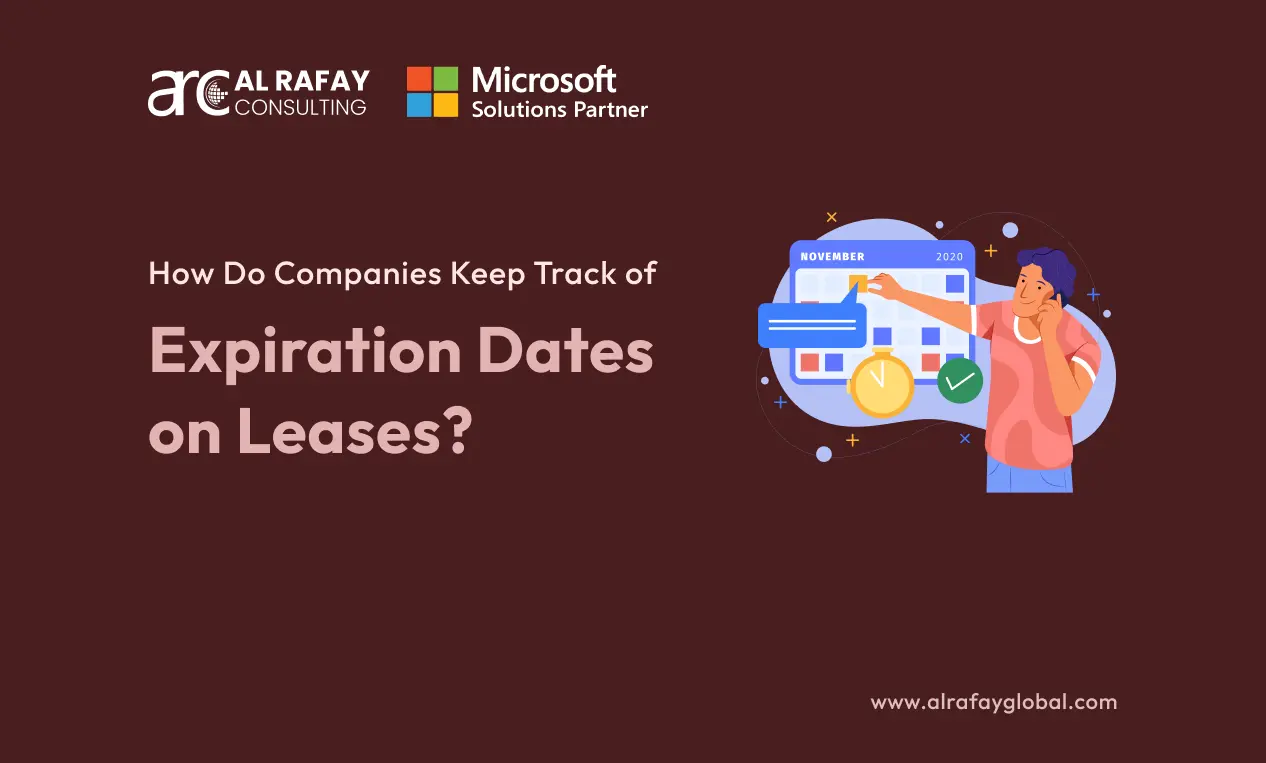Lease agreements play a pivotal role in the operational and financial management of businesses. Whether it’s leasing office space, equipment, or vehicles, these contracts allow companies to access necessary assets without the upfront capital expenditure associated with ownership. However, managing these leases, particularly tracking their expiration dates, can be a complex task. Failing to properly monitor lease expiration dates can lead to financial penalties, operational disruptions, or even regulatory non-compliance. As businesses scale and diversify, the sheer volume of leases can become overwhelming, making efficient tracking essential.
So, how do companies keep track of expiration dates on leases? Well, the simple answer is lease tracking software. According to a report by Allied Market Research, the global lease tracking software market is expected to grow to $9 billion by 2031.
This blog is all about lease tracking. We will take an in-depth look at how companies keep track of expiration dates on leases, the challenges they face, and the technology solutions available to streamline this critical business function. We will explore different lease types, and regulatory considerations, and provide insight into the best practices for ensuring that no lease deadline is missed. So, let’s start.
Types of Leases and Their Impact on Tracking
Leases come in various forms, and the type of lease a company holds significantly influences how companies keep track of expiration dates on leases. Understanding these distinctions is vital for effective lease management.
Explanation of Different Lease Types
There are two primary categories of leases recognized in business accounting: operating leases and finance leases. Each lease type has different financial and operational implications, affecting how companies manage and track them.
- Operating Leases: These are short-term leases where the lessee uses the asset but does not assume the risks or rewards of ownership. Think of renting office space or leasing equipment. The asset remains on the lessor’s balance sheet. For tracking purposes, operating leases often involve frequent renewals, which necessitates rigorous monitoring of expiration dates to avoid unwanted automatic renewals or missed termination opportunities.
- Finance Leases (Capital Leases): In finance leases, the lessee assumes many of the risks and benefits of owning the asset, even though the lessor retains legal title. These leases often involve long-term contracts with fixed terms, making expiration tracking somewhat more straightforward but still critical, especially when considering the financial reporting impacts at the end of the lease.
- Operating Leases: These are short-term leases where the lessee uses the asset but does not assume the risks or rewards of ownership. Think of renting office space or leasing equipment. The asset remains on the lessor’s balance sheet. For tracking purposes, operating leases often involve frequent renewals, which necessitates rigorous monitoring of expiration dates to avoid unwanted automatic renewals or missed termination opportunities.
How Lease Types Affect Tracking Requirements
The type of lease a company holds directly impacts its tracking requirements:
- Operating leases, which tend to be shorter, require close monitoring of renewals and extensions, especially if businesses are trying to maintain operational flexibility.
- Finance leases, being more long-term, may not need as frequent tracking, but accurate management is critical when preparing financial reports, given their impact on both liabilities and assets.
- Operating leases, which tend to be shorter, require close monitoring of renewals and extensions, especially if businesses are trying to maintain operational flexibility.
Regulatory and Accounting Considerations
In recent years, regulatory standards have introduced more stringent requirements on lease accounting, notably FASB ASC 842 in the U.S. and IFRS 16 internationally. Both standards require companies to report operating and finance leases on their balance sheets, increasing the complexity of lease management. Under ASC 842, for instance, companies must disclose the assets and liabilities arising from leases, regardless of whether they are operating or finance leases.
Accurate tracking of lease expiration dates is essential for compliance with these regulations. Failure to accurately track lease terms can result in incorrect financial reporting, which can lead to regulatory fines, investor distrust, and increased audit scrutiny.
Challenges in Lease Management
Effective lease management goes beyond simply knowing when a lease expires. The complexity of modern business leases can create significant challenges in ensuring smooth operations and financial accuracy.
Common Challenges Companies Face in Managing Lease Expiration Dates
- Volume of Leases: As businesses grow, so too does the number of leases they manage. This can include anything from real estate and office equipment to vehicles and technology. For large enterprises, managing hundreds or even thousands of leases manually becomes nearly impossible.
- Inconsistent Lease Terms: Lease agreements often vary in length, renewal options, and terms. Some leases may include clauses for early termination, automatic renewal, or rent escalation, adding layers of complexity to the management process.
- Disparate Systems: Many companies use disparate systems for lease management, relying on spreadsheets, calendars, and email reminders. This lack of a centralized system increases the risk of human error, especially when multiple departments (e.g., finance, operations, legal) are involved.
- Manual Tracking Risks: Companies that still rely on manual processes such as spreadsheets to track lease expiration dates are more prone to errors. Data may be entered incorrectly, lease terms may be misinterpreted, or alerts might not be set properly, leading to missed deadlines.
- Volume of Leases: As businesses grow, so too does the number of leases they manage. This can include anything from real estate and office equipment to vehicles and technology. For large enterprises, managing hundreds or even thousands of leases manually becomes nearly impossible.
Risk of Missing Deadlines and Financial Penalties
Missing a lease expiration date can have costly consequences. For example, if a company fails to terminate a lease on time, it may be forced into an automatic renewal at unfavorable terms. Alternatively, missing a deadline to renew a critical lease could lead to the loss of key assets or facilities, disrupting operations.
Financial penalties, such as late fees or penalties for non-compliance, can also accumulate quickly. For companies subject to ASC 842 or IFRS 16, incorrect reporting due to missed lease expirations can lead to restatements and potential fines from regulatory bodies.
Complexity of Lease Agreements and Varying Terms
Leases are often drafted with complex terms, such as rent escalation clauses, renewal options, early termination rights, or maintenance obligations. Keeping track of these nuances adds a layer of difficulty, particularly when different departments manage different aspects of lease compliance and monitoring.
Technology Solutions – How Do Companies Keep Track of Expiration Dates on Leases?
As the complexity of lease management grows, businesses are increasingly turning to technology to streamline and automate the process. Modern lease management software offers a wide array of features to ensure companies stay on top of their lease obligations.
Overview of Lease Management Software and Platforms
Lease tracking software is designed to centralize all lease-related information in one place, allowing for better visibility and control over expiration dates, renewal options, and financial obligations. These platforms automate many of the manual processes associated with lease tracking, reducing the risk of errors and improving compliance with accounting standards
Some well-known lease-tracking software solutions include Al Rafay Consulting’s Lease Tracker, LeaseQuery, CoStar Real Estate Manager, and Nakisa Lease Administration. These platforms typically offer features like:
- Centralized Lease Repository: All lease documents, key dates, and terms are stored in a single database, accessible by authorized personnel across different departments.
- Automated Notifications: Alerts are sent out as key dates approach, such as lease expiration or renewal deadlines, ensuring that no critical dates are missed.
- Integration with Financial Systems: Many lease management platforms integrate with ERP (Enterprise Resource Planning) systems like SAP or Oracle, ensuring that lease data flows seamlessly into financial reporting.
- Compliance Tracking: These platforms help companies ensure compliance with regulatory standards like ASC 842 by automating the tracking and reporting of lease-related liabilities and assets.
- Centralized Lease Repository: All lease documents, key dates, and terms are stored in a single database, accessible by authorized personnel across different departments.
Features and Capabilities of Al Rafay Consulting’s Lease Tracking Software
Modern lease tracking systems come with a variety of features that help businesses efficiently manage their lease portfolios. Some of the most useful features include:
- Customizable Dashboards: Provide real-time insights into upcoming expirations, lease terms, and financial obligations, allowing management to make data-driven decisions.
- Advanced Reporting Tools: Generate detailed reports on lease liabilities, asset utilization, and compliance with accounting standards.
- Data Visualization: Our lease tracker simplifies your analysis with intricate data visualizations, including graphs, charts, and tables.
- Customizable Dashboards: Provide real-time insights into upcoming expirations, lease terms, and financial obligations, allowing management to make data-driven decisions.
Cost Considerations and ROI of Adopting Automated Solutions
While automated lease management systems require an initial investment, the return on investment (ROI) can be significant. Companies that switch to automated systems often see cost savings from reduced manual labor, fewer financial penalties from missed deadlines, and improved accuracy in financial reporting.
For example, a company managing 500 leases manually might spend thousands of labor hours each year tracking lease terms and generating reports. By adopting an automated system, that same company could reduce labor costs by up to 87% while also minimizing the risk of costly mistakes.
Best Practices for Lease Expiration Tracking
To ensure effective lease expiration tracking, companies should follow a set of best practices that integrate technology, organizational processes, and financial planning.
Establishing a Centralized Lease Database
A centralized lease database allows all relevant departments (e.g., finance, legal, operations) to access the same lease information. This reduces the risk of miscommunication and ensures that key lease dates are tracked consistently. Ideally, this database should be part of a larger lease management platform that automates notifications and reporting.
Implementing Alerts and Notifications for Upcoming Expirations
Automated alerts and notifications are critical for ensuring that key lease dates, such as expirations and renewals, are not missed. Companies should configure their lease management system to send out alerts well in advance of important deadlines, allowing ample time for decision-making and negotiations.
Integrating Lease Management with Overall Financial Planning
Lease obligations often represent a significant portion of a company’s financial liabilities. Therefore, lease management should be integrated into the company’s overall financial planning and reporting processes. This ensures that lease obligations are accurately reflected in financial statements and that upcoming expirations are factored into budget planning.
Case Study: BioMed Realty and Al Rafay Consulting’s Lease Tracking Software
One notable example of successful lease management implementation is BioMed Realty, a leading provider of real estate solutions for life science and biotech companies. Managing a vast portfolio of properties across the U.S. and U.K., BioMed Realty faced significant challenges in efficiently tracking lease expirations, renewals, and compliance with complex lease terms.
As the number of leases grew, BioMed Realty needed a more efficient and scalable solution for tracking lease expiration dates, ensuring compliance with accounting standards, and improving financial reporting accuracy. The company turned to Al Rafay Consulting (ARC), a specialist in technology solutions for lease management, to help modernize its lease tracking processes.
Al Rafay Consulting’s Lease Tracking Solution
Al Rafay Consulting provided BioMed Realty with a comprehensive lease tracking solution designed to centralize lease data, automate the tracking of critical dates, and ensure compliance with standards.
Results and Benefits for BioMed Realty
By implementing Al Rafay Consulting’s lease tracking software, BioMed Realty saw immediate and significant improvements in its lease management processes. The key benefits included:
- Increased Efficiency: Lease automation boosted overall efficiency by up to 87%, streamlining the management of complex lease portfolios.
- Cost Savings: Automated lease management reduced administrative costs by as much as 62%, saving thousands annually per property.
- Error Reduction: The system’s accuracy helped BioMed Realty reduce paperwork-related errors by 91%, translating to annual savings.
- Increased Efficiency: Lease automation boosted overall efficiency by up to 87%, streamlining the management of complex lease portfolios.
Conclusion
Automated lease management systems offer the most effective solution, providing businesses with the tools they need to centralize lease data, automate notifications, and ensure compliance. For companies still relying on manual methods, the time has come to evaluate the ROI of automated solutions and adopt best practices for efficient lease expiration tracking.
If you want to implement state-of-the-art lease tracking software in your company, then contact our expert team at Al Rafay Consulting. Our developers and consultants have 10+ years of experience in developing custom leasing solutions.













